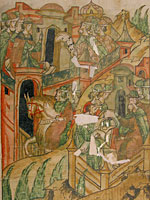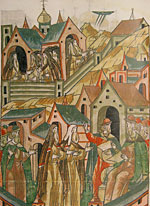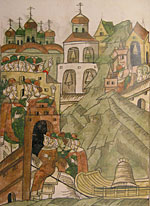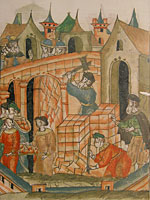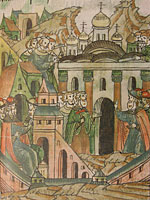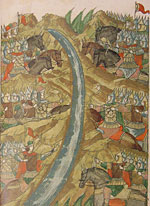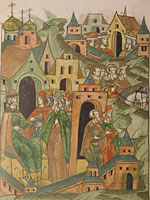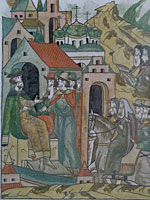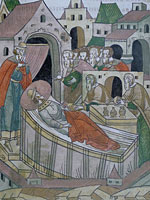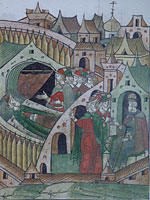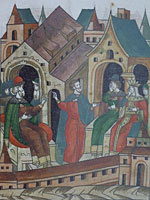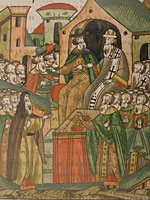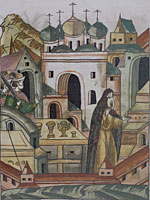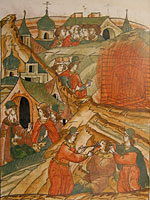Euphrosynus and His Time
Scribe Euphrosynus
The scribe Euphrosynus, the creator of the manuscript miscellanies, without which it is hard to imagine the history of Old Russian literature, - is considered to be a very mysterious person. Euphrosynus has left us little information about his background. We can judge him only for some inscriptions written by his own hand on the sheets of the manuscripts. He recorded the dates of the beginning and completion of the copying. The dates, mentioned in miscellanies compiled by Euphrosynus, fall from the 60s through the 90s of the 15th century: the earliest date is July 1463 (in the miscellany Kir. -Bel. 53/1130, fol. 155v.), the latest date is October 1491 ( in the miscellany Kir. -Bel. 11/1088, fol. 19r.). The Rite of Anointing in a manuscript from the collection of the St Sophia Cathedral of Novgorod bears the latest date found in the all autographs of Euphrosynus - February 1500 (NLR, Soph. 1462, fols. 98-112). That means that Euphrosynus lived in the second half of the 15th century and died not earlier than 1500, the exact dates of his birth and death are unknown. It was suggested that a son of Prince Dmitry Shemyaka was hidden under the name of Euphrosynus, however, there is no evidence to support this opinion. Another paradox should be noted: only few facts are known about the life of the monk but there is fairly large literature about Euphrasynus, numbering dozens of titles.
Euphrosynus calls himself a "priest" - he was a priestmonk and copyist in the Kirillo-Belozersky Monastery (St. Cyril of Beloozero's Monastery). His manuscripts includes numerous references to the books of the monastery library, along with which the Euphrosynus miscellanies have survived to the present. One Euphrosynus' inscription (in the manuscript Kir.-Bel. 11/1088, fol. 235) contains the brief biographical information: in winter 1477-78, 'he went to head a monastery'. There are different hypotheses about which exactly monastery Euphrosynus headed. It was most likely the Ferapontov convent to the east from the Kirillo-Belozersky Monastery, because the Euphrosynus manuscripts indicate that he well knew the library of this monastery. Not long time had passed before Euphrosynus came back to the Kirillo-Belozersky Monastery where, in 1479, he transcribed, and, possibly, edited Zadonshchina (Zadonshchina could be translated as 'the Battle beyond the Don River') - an epic monument of the late 14th century, which tells of the triumphant victory of the Russians over the Tatars in the Battle of Kulikovo in 1380.
All biographical facts, on which we can rely, are exhausted by this. His social origin, where he was born, when and in which monastery he became a monk, the milestones of his spiritual "career", the circumstances of the death forever remain a mystery. Only his miscellanies of encyclopedic scope have come down to us. His creative heritage gives the essential idea of this man - his personality, ideology, intellectual and spiritual needs, that is much more significant than facts. Euphrosynus becomes even more interesting for us, as a brilliant representative of the intellectual elite of Russian society at a crucial and relatively short period in the history of Russia, covering a few decades of the second half of the 15th cenury.
Key Historical Events of the Era
The situation in the 15th century called for unity within a divided nation. After the Mongol invasion of the 13th century, since the establishment of the Mongol domination of the Russian territories, the country experienced a period of feudal fragmentation. Northeastern Rus was dependent on the Golden Horde, and Southwestern Russia was controlled by Lithuania and Poland. Only the north-west with the free cities of Novgorod the Great and Pskov remained self-governing.
In 1380 Dmitry of the Don, the prince of Moscow, fought the troops of Golden Horde in the Battle of Kulikovo and won. During the period of the national revival that followed the Battle of Kulikovo, cities were springing up all over Russia, trade became more active, international relations were resumed. The task of uniting the Russian lands was perceived by all groups of the society.
Great Feudal War
In the second quarter of the 15th century, the problem was worsen by the feudal war, which lasted twenty years and brought so much grief and suffering that contemporaries called it the "Great Civil Disorder".Causes of the war rooted in the testament of Dmitry of the Don, who died in 1389. He appointed his son Vasily Dmitrievich a successor. The testament stated that if Vasily I died, his younger brother Yuri would take the throne. Vasily died in 1425 and left a child, known as Vasily II, who was proclaimed Grand Prince at the age of 10. His uncle, Yuri of Zvenigorod (Prince of Galich-Mersky) also made his own claims to the throne.
In 1433, Yuri attacked and took Moscow, Vasily II was forced to flee to Novgorod. In 1434, Yuri of Zvenigorod dies but his two sons, Vasily the Cross-Eyed and Dmitry Shemyaka, continued the struggle for power.
In 1445, Vasily II, who had regained the throne, suffered a severe defeat from the Tartar Khan in Suzdal. The Grand Prince was captured and was released at the cost of enormous ransom and concessions from Russia. His opponents took an opportunity to make a profit on public discontent caused by these political circumstances.
Dmitry Shemyaka organized a conspiracy to overthrow Vasily II. In February, 1446 Vasily II came to the Trinity Monastery of St. Sergius to pray, Shemyaka seize him, brought to Moscow, blinded, and then exiled to Uglich. As Vasily still had many supporters in Moscow, Dmitry recalled him from exile and give Vologda in his possession. Vasily II promised not to fight for the Moscow throne, took the oath and kissed the cross. In Vologda, Vasily traveled to the Kirillo-Belozersky Monastery, and Tryphon, Father Superior of Kirillo-Belozersk Monastery released him from the oath.
Kirillo-Belozersky Monastery ant its Role
It should be said about the special position which held the Kirillo-Belozersky Monastery (St. Cyril of Beloozero's Monastery). Founded by St.Cyril in 1397 (or, more likely in 1407) at a distance from Moscow on the northern edge of Russia, the monastery was a place of exile of the princes, noblmen, and church hierarchy felt into disgrace. The monastery was concurrently governed by the religious authority and the secular power: the government was represented by Bishop of Rostov and a feudal prince. This provided the relative independence of the monastery and gave it a special status. Despite the remoteness, the monastery played an important role in the social and spiritual life - all the political news reached it quickly. St.Cyril himself began to build up the monastery library, subsequently it was constantly replenished with book treasures. The monastery kept its own chronicle which often had an independent view of important events.It was believed that the oath breaker whould suffer eternal damnation. To renew the struggle for the throne, Vasily the Blind needed to rehabilitate himself. Tryphon, Father Superior of the St. Cyril Monastery, was able to take responsibility and gave Vasily the Blind an absolution from the oath so lately taken. In the eyes of society, Basil regained political rights and had the opportunity to act. Efficient support to Vasily II's army was given by the Tver Prince Boris Aleksandrovich. In the beginning of 1447, Dmitry Shemyaka's troops were defeated near Uglich; and on February 17, Vasily II was triumphantly back to Moscow. Dmitry Shemyaka fled to Novgorod, there he died in 1453 under mysterious circumstances: contemporaries had no doubt that he was poisoned. The long cruel civil war ended with his death.
As a result of the great feudal war, the St. Cyril Monastery gained primary importance for the ruling dynasty. It enjoyed the special protection of Vasily the Blind and his descendants. The monastery received rich donations, it became attractive (you can even say "prestigious") place for taking of monastic vows. Many monks were drawn from the Moscow aristocracy and officials of the Grand Prince. Thereby, the monastery acquired metropolitan status: exciting news from Moscow reached its walls only with a slight delay: whether it were news of the arrival of foreign diplomatic missions, or court gossips, or rumors about military preparations, etc. An atmosphere in the monastery promoted an expansion of mind and broadening of horizons for its inhabitants.
Euphrasynus and his Surroundings
First Euphrasynus' manuscripts refer to the time, when the Great Feudal War was already over. But Euphrasynus definitely was familiar with a immediate participant in the events - Governor Fedor Basenokwho served faithfully Vasily the Blind for many years. Shortly after the death of Vasily II in 1462, he was blinded by order of Vasily's successor Ivan III and was exiled in the Kirillo-Belozersky Monastery in the 70s of the 15th century. Stories of Basenok were a valuable source of evidence used by monks of the Kirillo-Belozersky Monastery for chronicle records. A brief summary of the chronicle was included by Euphrasynus in his miscellany.
There is no doubt that Euphrasynus personally knew the famous writer of the lives of the saints Pachomius Logothete who visited the Kirillo-Belozersky Monastery in 1462 to compile the biography of St. Cyril. One of the Euphrasynus miscellanies bears Pachomius' autograph (Kir.-Bel. 22/1099, fol. 281-282).
Reign of Ivan the Great (1462–1505)
The Kirillo-Belozersky monastery, which had rendered such a strong support to Vasily the Blind, did not loose touch with "high politics" during the reign of his son, Ivan III, the "gatherer of the Russian lands". Under Ivan III, the Muscovite state expanded threefold. Grand Prince of Moscow struggled not only with the feudal princes, but with the liberty of the Republic of Novgorod. In 1471, Ivan III undertook a campaign against Novgorod, and in 1477-78, the disobedient city lost its independence and was absorbed by Moscow like many other principalities.
To celebrate victory over Novgorod, Ivan III decided to renovate the Moscow Kremlin and churches in it. He invited the Italian architect Aristotle Fioravanti to constructed the magnificent Assumption Cathedral. The architect managed to find an architectural solution that combined the old Russian tradition with European architectural trends inspired by the spirit of the Renaissance.
During one generation, the Russian state emerged and make itself known in the whole inhabited world. Grand Prince Ivan III's power was far superior to all other Russian princes. The first sovereign of all Russia imperiously order and control over church affairs. He refused to maintain an existing balance between the interests of the state and the church. At the court of the Grand Prince, there were people who allow themselves to condemn the church rules, monasteries and monasticism. Among them were Novgorod priests Alexey and Denis, who were appointed Fathers Superior of the Assumption and the Archangel Cathedrals in the Moscow Kremlin, as well as dyaks Ivan and Fyodor Kuritsyns, the state secretaries in the grand princely administration, vested with confidence of Grand Prince.
State secretaries (dyaks) were very important figures at the Moscow court in the time of Ivan III. For instance, Fedor Kuritsyn was in charge of a foreign affairs, like a modern foreign minister. In 1483 – 1485, Kuritsyn headed a diplomatic mission to the Hungarian king Matthias Corvinus, visited Wallachia and Moldavia. From this trip, he conveyed a certain "Martynko". Under the nickname "Martynko" apparently meant the Polish astronomer and astrologer of the court of the Hungarian king Martin Bylica (1433/34 – 1493/94). Kuritsyn also had brought from Moldavia the text of the "Tale of Dracula" which soon appeared in one of the Euphrasynus manuscripts. In 1490 - 1494, Metropolitan Zosimus headed the Russian Church. Zosimus was the author of the Third Rome conception. He declared Moscow to be the "second Constantinople" which itself had succeeded Rome. Zosimus refered to Ivan III who had married Sophia Paleologue, a niece of Constantine XI, the last Byzantine emperor, as «the sovereign and autocrat of all Russia, the new Emperor Constantine of the new Constantinople — Moscow and of all the Rus». Metropolitan Zosimus rendered invaluable service to Ivan III in 1490, when the dynastic situation got seriously worse because of the untimely death of his eldest son and co-regent Ivan the Young. Immediate heirs of Ivan III were his grandson Dmitry, and the eldest son of Sophia Paleologue prince Basil. At the same time, the Grand Prince brothers - Andrew of Uglich and Boris of Volotsk - repeatedly demonstrated their obstinacy to their older brother and resigned themselves just due to his power and authority. In case of death of Grand Prince, there was great danger that the experienced Prince Andrew would became the de facto ruler at the nominal successor and seize the throne. Traditionally, agreements between the great and feudal princes were cemented by metropolitans. Feudal princes did not come to Moscow without receiving security assurances from metropolitans. In 1491, Prince Andrew of Uglich was summoned to Moscow and was arrested by order of the Grand Prince. Zosimus obviously first guaranteed the safety of Prince Andrew, but then he did not even use his lawful right of intercession for the disgraced. Prince Andrew of Uglich was starved to death in prison and died in 1493. The conscience of Ivan III and reputation of Metropolitan Zosimus had been stained with the guilt of his death, but the heirs of the Grand Prince were saved from attacks of the feudal princes. Soon Zosimus was removed from the metropolitan throne and retired to a monastery. He was officially accused of being drunkard, but according to unofficial sources, he was charged as being a secret heretic.Ivan III did not worry too much about heretic way of thinking of his court. He was anxious for the fact that many nobelmen, frightened of rumors of the coming Judgment Day, began to transfer their lands to monasteries. Grand Prince had different ideas about the use of monastic lands, on which he could place landowners who would be obliged to serve in the cavalry. An opportunity to impose a tax on monasteries also was attracting to the Moscow autocrat.
At first, the grandson was proclaimed the heir of Great Prince: in 1498, Dmitry the Grandson was crowned at Moscow with Monomakh's Cap for the first time in Russian history. But later Dmitry and his mother Yelena were taken into custody. That's when Ivan III summoned Superior Father Joseph of Volotsk and confessed to him that he knew about the heresy of Archpriest Aleksey, Fedor Kuritsyn and even Princess Yelena. While Joseph of Volotsk called archbishops to fight heretics, Ivan III planed to elininate monastic landholdings. The autocrat proposed to carry out these plans at the Council of 1503. The council was held, and the church hierarchs denied Grand Prince's request three times. The confrontation of the secular and religious authorities reached the peak and ended in July 1503, when Ivan III experienced a stroke and power passed into the hands of Basil III.